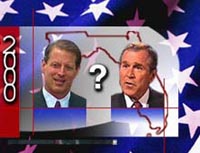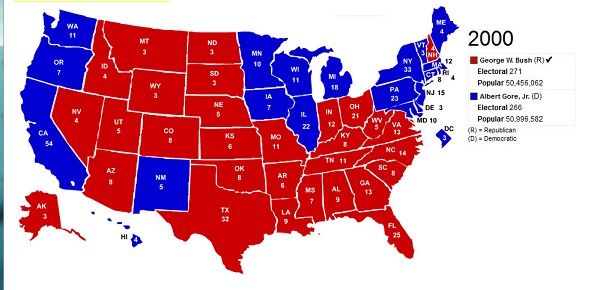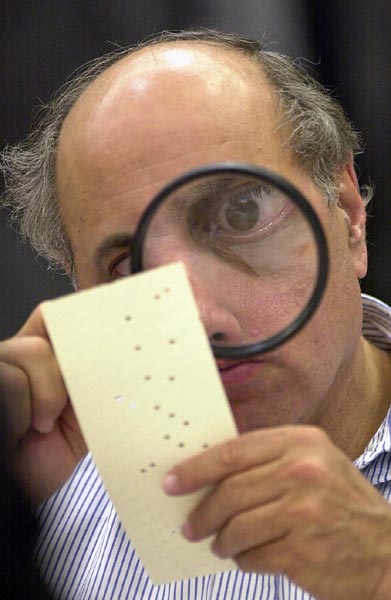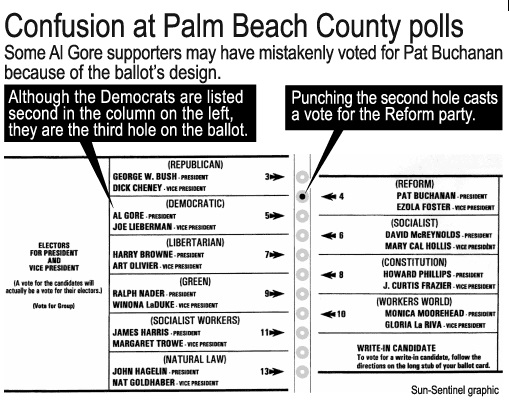
The 2000 election was the closest presidential contest in American history. The long electoral contest came down to a few hundred votes in the state of Florida. The outcome was eventually decided by the US Supreme Court decision Bush v. Gore which by a 5-4 decision put George W. Bush in the White House. Did the country get it right in the 2000 election, or will the events be a lingering black mark on our history?
Every 4 years we have a Presidential election in the US. Since the 22nd amendment was passed and ratified in 1951, no one is able to serve more than 2 terms as President, so Bill Clinton's time was up. The race came down to the Democrat and sitting Vice President Al Gore vs. Republican George W. Bush, the son of former President George H.W. Bush. Polls showed this to be a close election for sure. What no one could predict was how close, and how many votes would be garnered by 3rd party candidate Ralph Nader.
Little did anyone know that election night would be a wild adventure and a total fiasco and embarrassment for the networks. With the entire country watching, the networks began their long night of election reporting and projections. By 7:00 PM there were a few obvious calls rolling in, like South Carolina for Bush and Vermont for Gore. At 7:50 PM the Associated Press declared Al Gore the winner in the state of Florida based on exit polls. All of the major networks, in their effort to be first and run with the crowd, declared Gore the winner in Florida and counted Florida's 25 electoral votes in the Gore column. Then, over the next hour and a half, with state results flying in at a frantic pace, and all of the networks racing to see which candidate will get to 270 electoral votes first, the results from Florida started to look uncertain. At 9:54 PM the networks retracted their projection of Florida for Gore, and designated Florida as "too close to call." Oops! A lot of people had egg on their face as the networks have supposedly earned everyone's trust with their projections.
As the night wore on, it the count of electoral votes was as close as ever, and it was clear that the winner of Florida's 25 electoral votes would win the election. Bush had forged ahead and by 2:15 AM appeared to be ahead by close to 50,000 votes. At 2:30 AM Gore called Bush to concede the election. It was all over... No, it was not over by a long shot. By 3:00 AM Gore's people advised him that Bush's lead had shrunk to around 1000 votes, and Gore again called Bush at 3:30 AM to retract his concession. Most of the country had gone to bed with the election still in doubt and woke up on Wednesday, November 9 to find that the election was still in doubt. In fact, the final tally 5.8 million votes had Bush ahead by 1784 votes in the state of Florida, a difference of 0.03%.
Needless to say, recounts were requested and everything about the vote counting in Florida came under scrutiny. The problem was everyone involved in the recount and anything to do with the Florida results wanted their guy to win. Who could be impartial in this hugely important process of determining who the next President was going to be? Jeb Bush was governor of Florida and candidate George W's brother, so he recused himself from any of the process. But Katherine Harris was Florida's Secretary of State, the one person in charge of certifying the results, and she was a Republican and co-chair of Bush's election committee in Florida.
The weeks that followed were like living in an alternate universe. We'd just had an election but we really didn't know who the winner was going to be. Given the result was so close, Florida law said that an automatic machine recount needed to be performed. The results were available in days and Bush's lead shrank from 1784 votes to 327. In the meantime there were reports of widespread voting irregularities with the outdated machines that were used throughout the state. Thousands of ballots in all counties did not register a vote because the hole was not punched hard enough, or the machines malfunctioned because of they were clogged with the little pieces of cardboard hanging off the ballots called "chads". The law said that Gore could request a manual recount in counties of his choice, and 4 counties were chosen - Miami-Dade, Broward, Volusia, and Palm Beach. However, the deadline for recounts was 7 days after the election on November 14 and Katherine Harris refused to extend the deadline.
Volusia was the only county that could complete their manual recount by November 14, but by this time the Florida Supreme Court had intervened and essentially reset the deadline to November 26. The 3 remaining counties would have to work day and night to finish the recounts, and each county started and stopped a number of times as the courts and Katherine Harris all sent mixed messages about whether the manual recounts would count.
Meanwhile, the controversy in Palm Beach County was boiling over. Citizens were very upset when it was discovered that the butterfly ballot issued to its voters had confused many of the senior citizens and may have caused them to mistakenly vote for arch-conservative Pat Buchanan instead of Gore who they intended to vote for. While it was on the list of counties to be recounted, many called for a complete do over of the vote so each voter could vote for who they wanted correctly. A court ruled that a re-vote wouldn't be possible, but Democrats wanted very much to see the recount in Palm Beach County as it would work to Gore's advantage.
The recount process for the remaining 3 counties was extremely chaotic. There were no statewide standards on how to judge ballots where there was some ambiguity. With the entire country watching, we became all too familiar with hanging chads, dimpled chads, and pregnant chads. There was no clear way that all counties agreed on how to handle dimpled chads, or a chad that was partially bumped but not broken through the cardboard. On each of the recount teams were Democrats and Republicans who would arbitrate disputed ballots, and it was reported that the Republicans challenged many more ballots than necessary in an effort to slow down the process as it got closer to the deadline, given that their guy was still ahead.
By November 26, the Supreme Court imposed deadline, Broward County had completed their recount, Miami-Dade gave up because they knew they couldn't finish. Palm Beach County worked furiously up to the deadline but finished 2 hours after the 5 PM deadline, and Katherine Harris refused to accept late submission. She certified the vote with Bush ahead by 537 votes and announced that Bush had won the election.
The Gore team again challenged the vote outcome, and on December 8 the Florida Supreme Court intervened once again. This time it ruled that the manual recounts had to be continued and all of the undervotes (ballots the machine didn't register) statewide had to be manually recounted. This appeared to give Gore a chance as the manual recounts started up again. But right after, the Bush team challenged the manual recounts, and the US Supreme Court issued a "stay", or a ruling that forced all of the recounts to stop.
Four days later on December 12, the US Supreme Court issued a ruling that decided the election. They ruled on a 7-2 vote that the manual recounts were unconstitutional because of a lack of standards between the counties. But as for a remedy, by a 5-4 vote the court ruled that there wasn't time to perform a recount that would be constitutional, and therefore Bush was the winner as the clock had run out. Bear in mind, this court had 5 Republican appointed judges and 4 Democratic judges who all votes on their party line. Was there bias among the justices? You decide.
Gore went on television to concede the election despite many of his staff wanting him to fight on. His speech was humble, but he had run out of options. The Bush administration began its transition and would be moving into power in a very divided country. Republicans felt it was the right outcome, as the vote totals all through the process had Bush in the lead. Democrats felt that the election was stolen. All of the votes hadn't been counted and Democrats felt there was a good chance that Gore would have pulled it out in the end. Plus the snafu with the butterfly ballots in Palm Beach County, and Ralph Nader pulling in nearly 100,000 votes many of which would have been votes for Gore if Nader had dropped out. To top it off, reports surfaced that thousands of voters had been purged from the voter lists because their names matched up with a list of convicted felons. Katherine Harris had ordered that names matching, or nearly matching the felons list would be disqualified, and many legitimate voters were purged largely poor and people of color who would likely vote Democratic.
Looking back, consider how the US handled this relative to other countries. There was no violence, no tanks in the street, no military coup. No one took over the White House by force, then rounded up the opposition to send them to torture or even death. This is what happens in many countries but not ours. Our democracy withstood a close and disputed election result and we eventually moved on.












SUBMIT A COMMENT